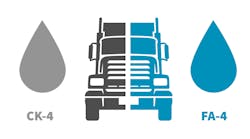New oils greasing the skids for more to come
The transition to the latest heavy-duty engine oil specifications is well underway, according to the organization that manages the standards. The American Petroleum Institute (API) has licensed about 400 CK-4 and more than 60 FA-4 oils submitted by large, medium, and small oil marketers.
While already significant, API expects availability to grow substantially over the next few years as more oil marketers add oils meeting the new standards to their product lines to address the needs of a variety of engine technologies—new and old, and in use both on- and off-highway.
“New API CK-4 and FA-4 oils should be readily available in bulk through diesel oil distributors for trucking fleets and other operators of diesel vehicles,” said Kevin Ferrick, senior manager of API’s Engine Oil Licensing and Certification System (EOLCS). “They are also available in packages through local retailers.”
API CK-4 oils are intended for diesel-powered engines previously using API CJ-4 oils, and API FA-4 oils are intended for newer engines, typically 2017 model-year engines and beyond. The upgraded API CK-4 and FA-4 oil specifications have been eligible for licensing since December 1, 2016, and the new oil products also help diesel engine manufacturers meet more stringent emissions requirements.
API CK-4 oils are backward-compatible, meaning they are designed to be used in engines where API CJ-4 engine oils have been previously recommended. CK-4’s introduction is long overdue: CJ-4 oils have been around for more than 10 years.
CK-4 provides a number of improvements over CJ-4: improved shear stability, oxidation resistance, and aeration control as well as protection against catalyst poisoning, particulate filter blocking, engine wear, piston deposits, degradation of low- and high-temperature properties, and soot-related viscosity increase.
FA-4 oils provide similar improvements over CJ-4 oils, but it is important to note that FA-4 oils are only intended for use in newer on-highway diesel engines. The API FA-4 oil standard was developed specifically to provide engine manufacturers with a tool for meeting more stringent greenhouse gas (GHG) emissions standards.
API has also developed a different API service symbol “donut” for API FA-4 so that consumers can easily distinguish between CK-4 and FA-4. The new API FA-4 donut features a shaded section (either black or color) to differentiate FA-4 oils from CK-4 oils. The CK-4 donut looks the same as the CJ-4 donut.
With the introduction of the new FA-4 oil category, fleets, shops, and technicians may have to learn how to manage CJ-4, CK-4, and FA-4 oils in their shops. API offers the following suggestions to ensure the new oils are being installed as recommended:
◗ Engine requirements—FA-4 oils may not be recommended for all new engines, so be sure to check with engine manufacturers to find out which engines are supposed to use FA-4 oil.
◗ Bulk tanks—Replacing CJ-4 with CK-4 should be a simple transition because CK-4 is backward-compatible and an improvement over CJ-4. Oil change facilities and fleets should drain down their CJ-4 bulk tanks before adding the new CK-4 oil.
◗ Dispensing oil—All dispensing equipment should be properly labeled with the product name, viscosity grade, and API standard to prevent misapplication.
◗ Education—Technicians should be made aware of the changes to the oil categories and the requirements for each.
Visit www.DieselOilMatters.com for more information about the new API CK-4 and FA-4 service categories and their use in on- and off-highway diesel vehicles and equipment.
About the Author
Kevin Jones 1
Editor
Kevin has served as editor-in-chief of Trailer/Body Builders magazine since 2017—just the third editor in the magazine’s 60 years. He is also editorial director for Endeavor Business Media’s Commercial Vehicle group, which includes FleetOwner, Bulk Transporter, Refrigerated Transporter, American Trucker, and Fleet Maintenance magazines and websites.
